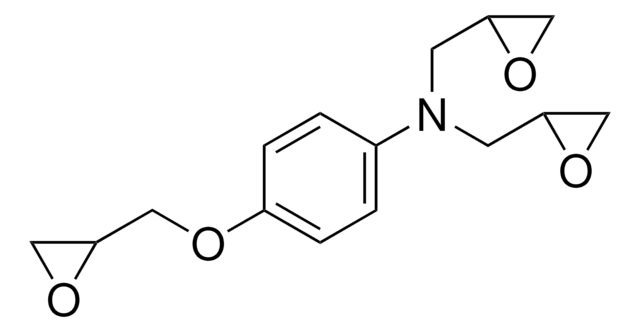430269
(2-Ethyl-2-(hydroxymethyl)-1,3-propanediol polymer with (chloromethyl)oxirane
technical grade
Synonym(s):
1,3-Propanediol, 2-ethyl-2-(hydroxymethyl)-, polymer with (chloromethyl)oxirane (9CI), Epichlorohydrin-trimethylolpropane copolymer, Trimethylolpropane-epichlorohydrin copolymer
About This Item
Recommended Products
grade
technical grade
form
viscous liquid
eq. wt.
138-154 (perchloric acid method)
mol wt
226.70 g/mol
refractive index
n20/D 1.477 (lit.)
viscosity
120-180 cP(25 °C, Ubbelohde)(lit.)
density
1.157 g/mL at 25 °C (lit.)
SMILES string
ClCC1OC1.OCC(CO)(CC)CO
InChI
InChI=1S/C6H14O3.C3H5ClO/c1-2-6(3-7,4-8)5-9;4-1-3-2-5-3/h7-9H,2-5H2,1H3;3H,1-2H2
InChI key
HNCWRXZORGVRPD-UHFFFAOYSA-N
Related Categories
General description
Application
Features and Benefits
Signal Word
Danger
Hazard Statements
Precautionary Statements
Hazard Classifications
Aquatic Chronic 2 - Carc. 2 - Eye Dam. 1 - Muta. 2 - Repr. 2 - Skin Corr. 1B - Skin Sens. 1
Storage Class Code
8A - Combustible corrosive hazardous materials
WGK
WGK 2
Flash Point(F)
Not applicable
Flash Point(C)
Not applicable
Personal Protective Equipment
Certificates of Analysis (COA)
Search for Certificates of Analysis (COA) by entering the products Lot/Batch Number. Lot and Batch Numbers can be found on a product’s label following the words ‘Lot’ or ‘Batch’.
Already Own This Product?
Find documentation for the products that you have recently purchased in the Document Library.
Customers Also Viewed
Our team of scientists has experience in all areas of research including Life Science, Material Science, Chemical Synthesis, Chromatography, Analytical and many others.
Contact Technical Service











